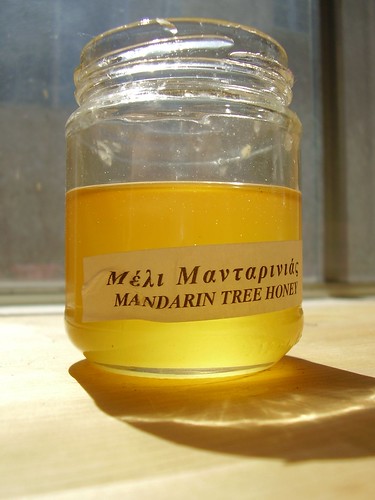
I am a honey fanatic, and luckily for me, Greece is a great place to find great honey. Unlike, say, its wine, Greece's honey has an excellent reputation. The history of honey production in Greece is a long one and may even extend before the advent of written records, although there is little archaeological evidence to support this. Bronze Age Mycenaean (15th-12th centuries BC) tablets tell of the trade of jars of honey, but not of its production. One of the first written mentions of beehives is this charmingly misogynistic passage from Hesiod's Theogony (an 8th century BC poem about the birth of the gods) in which he compares women to drones, getting fat off the hard work of others:
"And as in thatched hives bees feed the drones whose nature is to do mischief -- by day and throughout the day until the sun goes down the bees are busy and lay the white combs, while the drones stay at home in the covered skeps and reap the toil of others into their own bellies – even so Zeus who thunders on high made women to be an evil to mortal men, with a nature to do evil." (Theogony 594-599, trans. H.G. Evelyn-White)
In the 5th century BC and later, archaeological evidence shows that bees were kept in ceramic beehives-- large pottery jars in which the interior had been incised before firing to provide a rough surface for the bees to attach the combs.
Honey production is still a major part of Greek agriculture, and we encountered plenty of beehives while doing our archaeological survey there. Greek honey is also, unfortunately, quite expensive (as honey tends to bee in most parts of the world, I suppose). My absolute favorite type of Greek honey is pure thyme honey- its flavor is amazingly floral and complex. It is also the most expensive type of honey- 12 Euros for a little jar in one store...in retrospect maybe I should have bought some, as it is very difficult to find here, and sooo good.
The honey pictured above was the only jar I brought home for myself on this trip. Its flavor can pretty much be summed up in one word: SWEET! The sweetness hits you like a truck but fades fast- there's not much depth of flavor here. Still, very nice on toast, and I 've yet to meet a honey I didn't like.
For more information on the history of honey production in Greece and elsewhere, see The World History of Beekeeping and Honey Hunting, by Eva Crane. Taylor and Francis, 1999.
September 9, 2007
Greek Honey
Subscribe to:
Post Comments (Atom)







4 comments:
I completely agree with you about honey, especially Greek honey.
I especially like this new post of yours - the historical background and the quote from Theogony are great.
Excellent post, I carry a few brands of greek honey and Attiki Honey is my fav greek honey.
Greek honey is not that expensive when you compare the sizes and prices to normal honey sold in the supermarkets. Also, when factoring in the better taste, quality and Exclusivity , greek honey is a pretty good deal. You can get various brands from my site here http://www.christosmarket.com/Greek-Honey-s/43.htm
A great article indeed. The historical part of it is awesome!
Well you can see this site in order to buy honey online if some wants and only Greek honey of course.
thanks for your article, the historical and about the honey. unfortunately i would have to agree with you that in general greek wine isnt so good. however, just to set the record straight, i did find a wine in a box no less that is pretty darn good, called Lafazanis. also the Rhodians make a decent sparkling wine called Cair.
Post a Comment